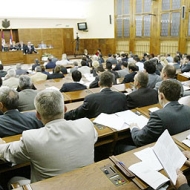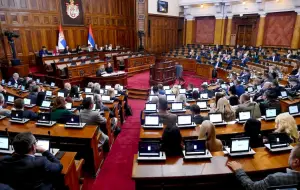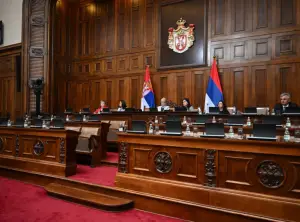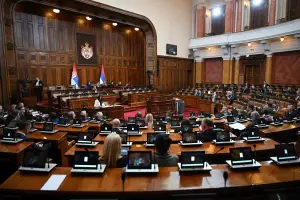Q:
A:
Serbian parliament approves amendments to laws on government, ministries
Belgrade,
5 July 2008
Members of the Serbian parliament adopted late last evening amendments to the laws on government and ministries.
According to amendments to the Law on the Serbian government, four deputies to the prime minister will be appointed; three will also be ministers, while one will be without portfolio.
It is envisaged that the first deputy will hold the post of deputy prime minister, with all the authorities of the prime minister’s office, and the prime minister will have the deciding vote in unresolved cases.
Of 157 MPs present, 129 voted in favour of the amendments and 28 were against.
The Law specifies that the prime minister appoints one of the deputies as the first deputy, the deputy prime minister, who will be authorised to take over the prime minister’s duties in the case of his absence or incapacity.
The deputy prime minister will have all the authorities of the prime minister, except proposing new elections or relieving members of the government of their duty.
The first deputy, or deputy prime minister, will have the responsibility to help the prime minister in guiding and directing the government, ensuring unified political actions by the government and coordination of the government’s work.
It was stated that these amendments were necessary in order to make existing decrees more precise in the case of the prime minister’s absence or incapacity.
The second novelty is that if the government has an even number of members, a government decision will be made if a minimum of half of the government members vote for it, under the condition that the prime minister has voted in favour of it.
It was stated that this novelty has been introduced in order to remove the possibility of a blockage in decision making in the case that the government has an even number of members.
The Law on the Serbian government will come into force on the day of its publication in the Official Gazette.
According to the Bill on ministries, the new Serbian government will have 24 ministries. The law was approved by parliament by majority vote.
This law was approved with 128 MPs voting in favour and one against, while others did not attend the voting.
According to the law, there will be two new ministries, for human and minority rights and the National Investment Plan (NIP).
The government, as until now, will consist of the ministries of foreign affairs, defence, interior affairs, finance, justice, agriculture, forestry and water management, economy and regional development, energy and mining, infrastructure, public administration and local self government and the ministry for Kosovo-Metohija.
The government will also include ministries of trade and services, science and technological development, education, youth and sports, health, culture, religion and Diaspora. The Ministry for Telecommunications will also cover the area of information society.
The Ministry of Labour and Social Policy has been retained as well, and the Ministry of Environmental Protection will also cover the area of spatial planning.
The ministry for human and minority rights will deal with all the issues concerning the position of national minorities, national councils, election of national councils, representing Serbia in the European Court of Human Rights and realising the rights of minorities.
It was stated that this ministry is needed because Serbia is an extremely multiethnic society containing groups of various religious and ethnic identities.
The ministry for NIP will deal with all matters related to the development of the NIP, strategic planning, initiating project implementation and the NIP budget.
The law envisages changes in the sphere of work of certain ministries. The Ministry of Environmental Protection will now expand its work to include spatial planning, urban building, utility infrastructure, building land, underground water and geological surveys.
It was stated that it is necessary to have a separate ministry to deal with the area of environmental protection and spatial planning in order to have adequate coordination, implementation and monitoring of large projects which are underway or upcoming.
The Infrastructure Ministry will deal with matters related to rail, road, water, and air transport, which concern regulation of the traffic system, building traffic infrastructure, domestic and international transport, as well as measures for encouraging traffic system development.
The Law will come into force on the day of its publication in the Official Gazette.
It is envisaged that the first deputy will hold the post of deputy prime minister, with all the authorities of the prime minister’s office, and the prime minister will have the deciding vote in unresolved cases.
Of 157 MPs present, 129 voted in favour of the amendments and 28 were against.
The Law specifies that the prime minister appoints one of the deputies as the first deputy, the deputy prime minister, who will be authorised to take over the prime minister’s duties in the case of his absence or incapacity.
The deputy prime minister will have all the authorities of the prime minister, except proposing new elections or relieving members of the government of their duty.
The first deputy, or deputy prime minister, will have the responsibility to help the prime minister in guiding and directing the government, ensuring unified political actions by the government and coordination of the government’s work.
It was stated that these amendments were necessary in order to make existing decrees more precise in the case of the prime minister’s absence or incapacity.
The second novelty is that if the government has an even number of members, a government decision will be made if a minimum of half of the government members vote for it, under the condition that the prime minister has voted in favour of it.
It was stated that this novelty has been introduced in order to remove the possibility of a blockage in decision making in the case that the government has an even number of members.
The Law on the Serbian government will come into force on the day of its publication in the Official Gazette.
According to the Bill on ministries, the new Serbian government will have 24 ministries. The law was approved by parliament by majority vote.
This law was approved with 128 MPs voting in favour and one against, while others did not attend the voting.
According to the law, there will be two new ministries, for human and minority rights and the National Investment Plan (NIP).
The government, as until now, will consist of the ministries of foreign affairs, defence, interior affairs, finance, justice, agriculture, forestry and water management, economy and regional development, energy and mining, infrastructure, public administration and local self government and the ministry for Kosovo-Metohija.
The government will also include ministries of trade and services, science and technological development, education, youth and sports, health, culture, religion and Diaspora. The Ministry for Telecommunications will also cover the area of information society.
The Ministry of Labour and Social Policy has been retained as well, and the Ministry of Environmental Protection will also cover the area of spatial planning.
The ministry for human and minority rights will deal with all the issues concerning the position of national minorities, national councils, election of national councils, representing Serbia in the European Court of Human Rights and realising the rights of minorities.
It was stated that this ministry is needed because Serbia is an extremely multiethnic society containing groups of various religious and ethnic identities.
The ministry for NIP will deal with all matters related to the development of the NIP, strategic planning, initiating project implementation and the NIP budget.
The law envisages changes in the sphere of work of certain ministries. The Ministry of Environmental Protection will now expand its work to include spatial planning, urban building, utility infrastructure, building land, underground water and geological surveys.
It was stated that it is necessary to have a separate ministry to deal with the area of environmental protection and spatial planning in order to have adequate coordination, implementation and monitoring of large projects which are underway or upcoming.
The Infrastructure Ministry will deal with matters related to rail, road, water, and air transport, which concern regulation of the traffic system, building traffic infrastructure, domestic and international transport, as well as measures for encouraging traffic system development.
The Law will come into force on the day of its publication in the Official Gazette.











